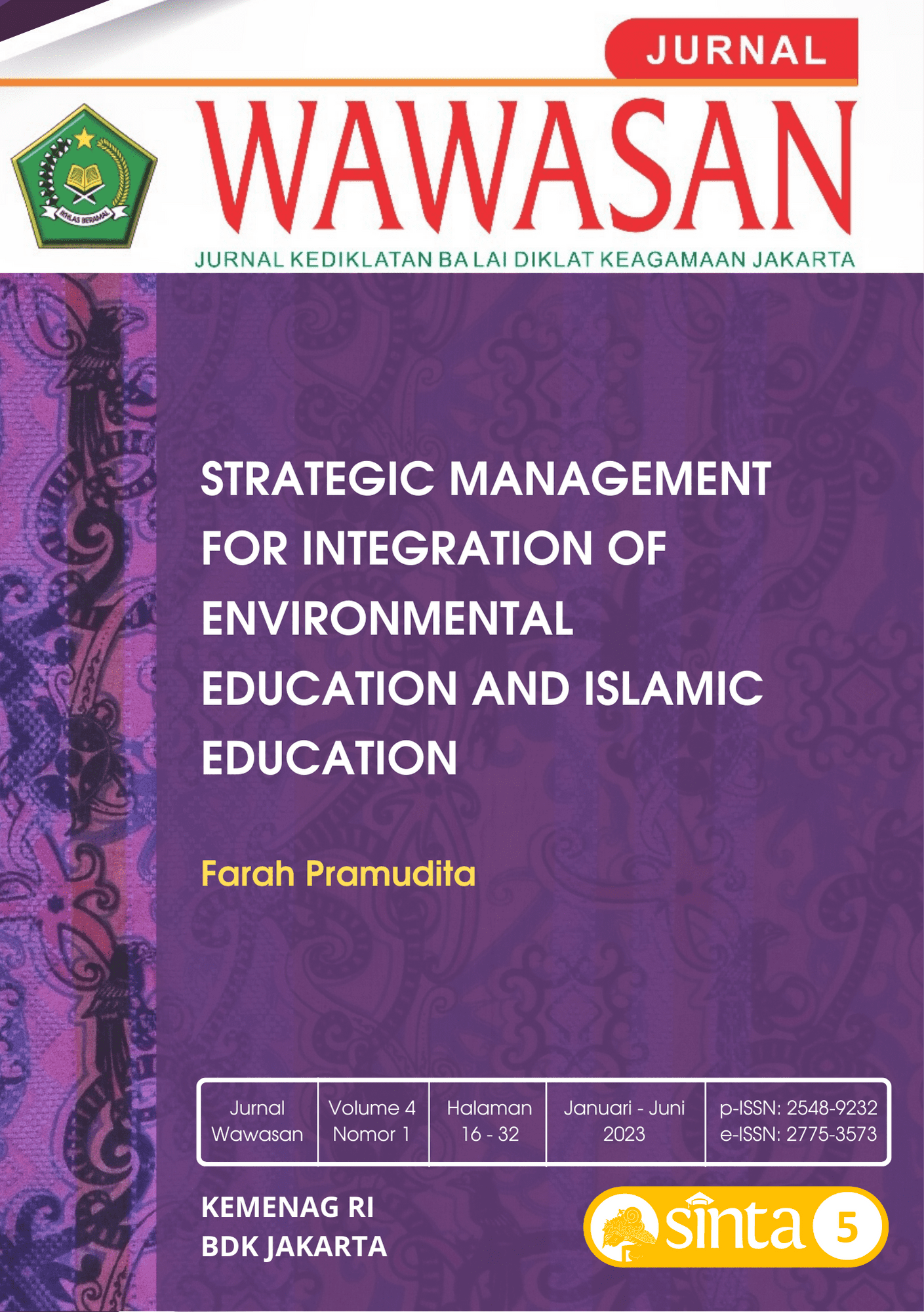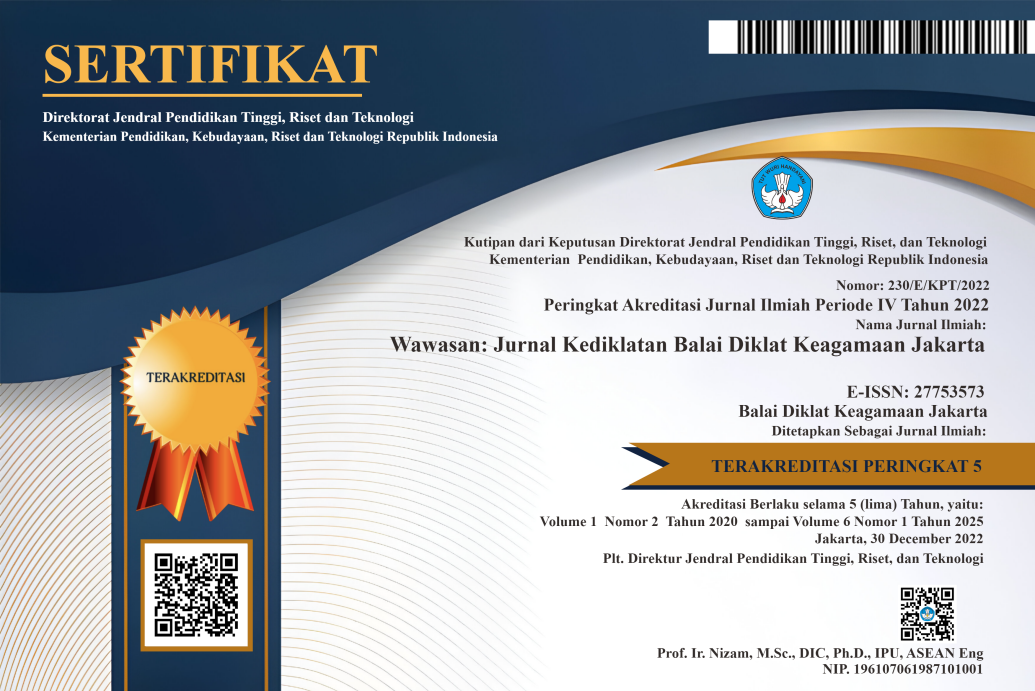STRATEGIC MANAGEMENT FOR INTEGRATION OF ENVIRONMENTAL EDUCATION AND ISLAMIC EDUCATION
DOI:
https://doi.org/10.53800/wawasan.v4i1.232Keywords:
strategic management, environmental education, Islamic educationAbstract
Abstract
The purpose of this research describes the integration of environmental education and Islamic education through strategic management concepts. Problem research focuses on integrating environmental and Islamic education in Islamic educational institutions. It was conducted in the qualitative method of case studies and analyzing strategic management data using Wheelen and Hunger's theory. The results were divided into four steps to integrate environmental education and Islamic education, which are as follows: 1). Environmental scanning by SWOT (Strengths, Weaknesses, Opportunities, and Threats) matrix; 2). Strategy formulation interprets environmental scanning into mission, objectives, strategies, and policy; 3). Strategy implementation emphasizes programs, budgets, and procedures; 4). Evaluation and control are the performance of teachers' and students' behavior toward the environment; in conclusion, that integration can be shaped if four strategic management steps are run in Islamic educational institutionDownloads
References
AFED. (2019). Environmental Education for Sustainable Development in Arab Countries; Arab Forum for Environment and Development (AFED) Report. Technical Publications and Environment & Development magazine Beirut, Lebanon.
Bsoul, L., Omer, A., Kucukalic, L., & Archbold, R. H. (2022). Islam ’ s Perspective on Environmental Sustainability : A Conceptual Analysis. Social Sciences.Doi.Org/10.3390/Socsci11060228.
Bonnett, M. (2023). Environmental Consciousness, Nature, and the Philosophy of Education: Some Key Themes. Environmental Education Research, 29:6, 829-839, DOI: 10.1080/13504622.2021.1951174
Constantinescu, C. (2014). Valuing Interpendence of Education, Trade and the Environment for rhe Achievement of Sustainable Development. Procedia- Sosial and Behavioural Sciences 116 (2014) 3340 - 3344.
Creswell, J. W. (2007). Qualitative Inquiry & Research Design; Choosing Among Five Approaches. Sage Publication Ltd. California. USA.
David, F. R. (2011). Strategic Management Concept and Cases. Pearson Education,Inc. New Jersey.
Efendi, M. H., Irawati, M. H., Rohman, F., & Gofur, A. (2017). Islamic View of Environmental Conservation Education in Pondok Pesantren Nurul Haramain Lombok Barat - Indonesia. Journal of Education and Practice. ISSN 2222-1735 (Paper) ISSN 2222-288X (Online) Vol. 8, No. 12, 2017, 8(12), 137–140.
Fidler, B. (2002). Strategic Management for School Development; Leading your School’s Improvement Strategy. Paul Chapman Publishing, A SAGE Publication Company. London.
George, M. W. (2008). The Elements of Library Research What Every Student Needs to Know. Princeto University Press. New Jersey.
Gurel, E., & TAT, M. (2017). SWOT Analysis: A Theoritical Review. The Journal of International Social Research, 01(51), 6–11.
Haddad, M. (2006). An Islamic Approach towards Environmental Education. Canadian Journal of Environmental Education, 11, 2006, 57–73.
Indrajit, R. E. (2013). Manajemen Strategis Model Hunger-Wheelen. E-Artikel Sistem Dan Teknologi Informasi, 4(C), 1–4.
Kholis, N. (2014). Manajemen Strategi Pendidikan (Formulasi, Implementasi, dan Pengawasan). UIN Sunan Ampel Press (UIN SA Press).
Kollmuss, A., & Agyeman, J. (2002). Mind the Gap : Why Do People Act Environmentally and What Are the Barriers to Pro-Environmental Behavior. Environmental Education Research , Vol.8, No.3, 2002, August 2002. https://doi.org/10.1080/1350462022014540
Reis, G., & Scott, J. (2018). International Perspectives on the Theory and Practice of Environmental Education : A Reader (Volume 3). Springer International Publising AG, Switzerland.
Republika. (2022). Isi Tujuh Risalah Kongres Umat Islam untuk Indonesia Lestari. Republika.co.id.
Rodin, D. (2017). Alquran dan Konservasi Lingkungan: Telaah Ayat-Ayat Ekologis. Al-Tahrir: Jurnal Pemikiran Islam, 17(2), 391–410. https://doi.org/10.21154/altahrir.v17i2.1035
Sekarwinahyu, M. (2019). Sejarah dan Konsep Dasar Pendidikan Lingkungan Hidup (Edisi 3, pp. 1.1-1.42). pustaka.ut.ac.id.
Stibbe, A. (2019). Education For Sustainability And The Search For New Stories to Live By. University of Gloucestershire. UK.
Sugiyono. (2013). Metode Penelitian Kuantitatif, Kualitatif ,Dan R&D. Alfabeta. Bandung.
The Quran. English Translation. (2004). The Quran. English Translation And Notes by Sahih International. Al-Muntada Al-Islami. Saudi Arabia.
UNESCO. (1977). Intergovernmental Conference on Environmental Education. Tbilisi (USSR). In Environmental Policy and Law (Vol. 3, Issues 3–4). UNESCO. https://doi.org/10.1016/S0378-777X(77)80134-0
Vicente-Molina, M. A., Fernández-Sáinz, A., & Izagirre-Olaizola, J. (2013). Environmental Knowledge and Other Variables Affecting Pro-Environmental Behaviour: Comparison of University Students from Emerging and Advanced Countries. Journal of Cleaner Production, 61, 130–138. https://doi.org/10.1016/j.jclepro.2013.05.015
Wheelen, T. L., & Hunger, J. D. (2012). Strategic Management and Business Policy Toward Global Sustainability. Pearson Education,Inc. New Jersey.
Zalenieni, I., & Pereira, P. (2021). Higher Education For Sustainability: A Global Perspective. Geography and Sustainability 2 (2021) 99-106.

Published
Issue
Section
License
Copyright (c) 2023 Wawasan: Jurnal Kediklatan Balai Diklat Keagamaan Jakarta

This work is licensed under a Creative Commons Attribution-ShareAlike 4.0 International License.

















